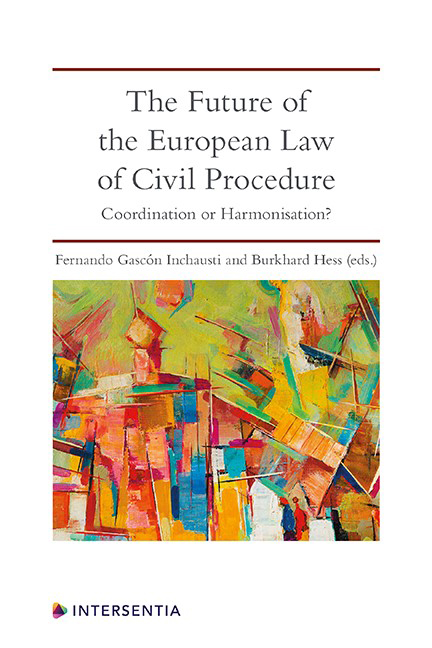Book contents
- Frontmatter
- Contents
- List of Cases
- List of Authors
- Introduction
- PART I METHODOLOGICAL APPROACHES
- PART II THE CURRENT SITUATION: VERTICAL AND HORIZONTAL HARMONISATION
- PART III CURRENT INITIATIVES FOR FURTHER HARMONISATION: The ELI/UNIDROIT Project
- The 2017 Directive Proposal on Common Minimum Standards of Civil Procedure
- Index
- ABOUT THE EDITORS
Constitutionalisation of European Civil Procedure as a Starting Point for Harmonisation?
Published online by Cambridge University Press: 23 July 2020
- Frontmatter
- Contents
- List of Cases
- List of Authors
- Introduction
- PART I METHODOLOGICAL APPROACHES
- PART II THE CURRENT SITUATION: VERTICAL AND HORIZONTAL HARMONISATION
- PART III CURRENT INITIATIVES FOR FURTHER HARMONISATION: The ELI/UNIDROIT Project
- The 2017 Directive Proposal on Common Minimum Standards of Civil Procedure
- Index
- ABOUT THE EDITORS
Summary
INTRODUCTION
Constitutionalisation may be concisely defined as the incremental re-shaping of statutory law by means of its judicial interpretation in the light of constitutional principles and values. Within the different fields of EU law, this concept can be approached either broadly or broken down into more specific aspects, notably a purely judicial-protection-based perspective, dealing with how Article 47 of the EU Charter of Fundamental Rights (CFR) infuses, amends or supplements the statutory law, at both EU and domestic levels. This is the perspective I have adopted for the present contribution.
Two characteristic features of how the European Court of Justice (ECJ) deals with EU law appear to favour its constitutionalisation. These are the affinity towards teleological interpretation and the Court‘s constructive use of precedent, which allows the incremental creation of constitutional principles by way of de-contextualisation of specific considerations. Does this also apply to procedural rights? This contribution will argue that, within the limits of its jurisdiction, when dealing with procedural issues under Article 47 CFR the ECJ certainly fosters a common standard of procedural rights by construing primary and secondary law in a way that ensures its compliance as well as that of domestic rules and practices with the requirements of fair, effective and expedient judicial protection.
The European Court of Justice may not aim at constitutionally harmonising civil procedure across the EU and individual, case-specific judgments are certainly no blue-prints for future procedural legislation, even less so where they concern other fields of EU law. Still, insofar as they all implement and further characterise the guarantees enshrined in Article 47 CFR, they are indeed a useful starting point for legislative harmonisation. The argument in this chapter develops as follows. In the first instance, the defining aspects of fair trial in civil matters will be recalled (section II); secondly, the scope of ECJ involvement with procedural issues will be outlined (section III); and thirdly, the Court‘s method of constitutionalisation as understood by this author will be described (section IV).
THE CONCEPT OF FAIR TRIAL UNDER ECHR AND EU LAW
While this chapter specifically addresses the EU law guarantees as interpreted by the ECJ, there is no way around a brief exposition of the ECHR requirements for civil proceedings, which have previously been the prime benchmark for EU law interpretation and are still good law within the scope of Article 47 CFR.
- Type
- Chapter
- Information
- The Future of the European Law of Civil ProcedureCoordination or Harmonisation?, pp. 69 - 88Publisher: IntersentiaPrint publication year: 2020



